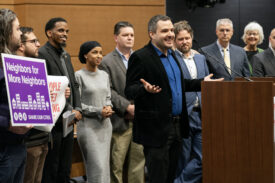Traffic congestion—and the lost fuel and time that comes with it—costs billions of dollars each year in the US. That much is clear.
How many billions, though, is a bit of a mystery. According to this book, Street Smart, the total annual cost of congestion in the United States is about $108 billion. Or perhaps $63.2 billion. Or maybe it was just $12 billion.
It depends, apparently, on what you’re looking at.
The highest estimate for the annual cost of congestion–$108 billion, in 2000 dollars—apparently accounts for the cost of all of the time that people spend idling in traffic. That is, if you could go straight from where you are to where you want to go, without having other cars slow you down on route, the economic value of the time that we’d collectively save as a nation is about $108 billion. (I haven’t reviewed the book’s estimates, but traffic time cost is often tallied as half the hourly cost of the prevailing wage).
Adjusted for inflation, this means that traffic congestion costs over $400 per person, every single year. In short, a lot.
The medium estimate ($63.2 billion per year) comes from a different source, and covers both delay and fuel costs.
But here’s the thing: for most congestion, the cure is more expensive than the problem itself. Take New York City. Driving in Manhattan is a big pain; traffic crawls along at under 10 miles an hour. But there’s no cheap way to make it go any faster. Putting in a new road is more or less out of the question: the real estate is just too pricey, and tunneling and aerials are hugely expensive. Besides, excess demand for car travel is so great, that new trips would quickly soak up any extra supply of roads. And that would leave the average car traveling no faster than it was before—meaning big costs for small gains in mobility, and a minimal decrease in congestion.
New York City is, perhaps, a special case. But if the estimates reported in Street Smart are correct, then nearly 90 percent of all congestion in the country is just too expensive to fix. People would rather wait in traffic than spend the money that would be necessary for them to move faster.
That’s the source of the lower estimate for congestion costs nationwide—$12 billion. That lower figure represents the amount of money that people would actually be willing to pay to reduce congestion—or, rather, the amount they’d be willing to pay out of their bank accounts, rather than with their time. That puts the annual economic losses from traffic congestion in the US, adjusted for inflation, at about $45 per person.
That’s not all that much. Apparently, for all we complain about congestion, it may really not a first-order problem, either socially or economically.
Economic losses from congestion, for example, amount to less than a percent of the annual cost of owning a car. And car crashes are way more expensive; the comprehensive cost of car crashes may top $1,000 per person in Washington State—which is more than an order of magnitude greater than the economic losses from traffic delays.









mhlangag
send me everyday.